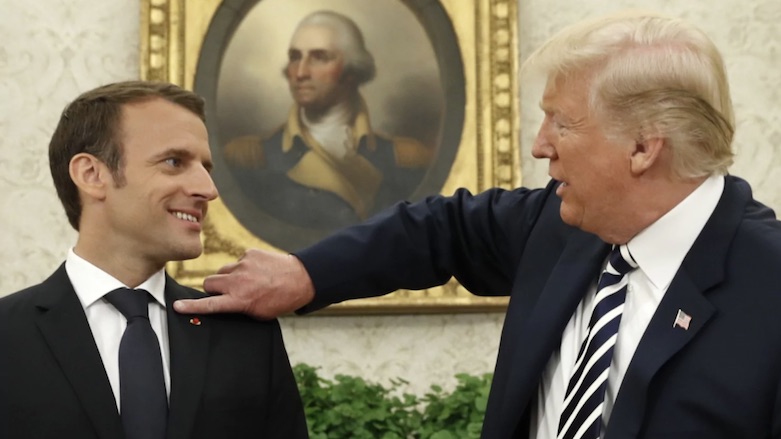Trump and Macron discuss new approach to Iran and Syria

WASHINGTON DC (Kurdistan 24) – French President Emmanuel Macron arrived in Washington on Monday evening for the first formal state visit of a foreign leader to Washington during President Donald Trump’s administration.
Of all European leaders, Macron has established the best relationship with America’s unconventional President. Trump visited Paris last summer—on July 14, Bastille Day, a turning point in the early days of the French revolution, and the two leaders have enjoyed a friendly relationship since.
Macron’s visit was full of republican symbolism—reminders that France aided the American revolutionaries in their war of independence against the British, starting with an elegant dinner at Mt. Vernon, the estate of George Washington, who led the American Continental Army against the British.
High on Macron’s agenda in Washington are two Middle Eastern issues: Iran and Syria.
Yet another deadline for the Iran nuclear agreement, known as the JCPOA (Joint Comprehensive Plan of Action), looms. Trump must decide by May 12, whether he wants to remain a party to the JCPOA or pull out of it.
The three European countries that are also parties to the JCPOA—France, Germany, and Britain—do not see a reasonable alternative.
On Syria, Trump has said that he will withdraw US forces within the next six months. The concern of Macron, and others, including Israel, is that any precipitous US withdrawal from Syria will allow Iran and Russia to step into the vacuum.
On both issues, Macron, who has been dubbed “the Trump Whisperer,” appeared to elicit new flexibility from the US president.
Macron suggested keeping the JCPOA, but adding new understandings to address Trump’s three concerns: 1) Iran’s destabilizing activities in the Middle East; 2) its missile program; and 3) the prospect that after 2025, when the JCPOA expires, Iran will develop nuclear weapons.
After meeting with Macron, Trump seemed to signal a new openness on the JCPOA. “We’ll see,” Trump said during a joint press conference, if “it will be possible to do a new deal with solid foundations.”
Trump also seemed to move away from his insistence that the US must leave Syria quickly, after the defeat of the Islamic State (IS).
“I want to come home,” Trump said. “But I want to come home also with having accomplished what we have to accomplish,” he continued, adding, “we don’t want to give Iran open season to the Mediterranean.”
But, as Trump made clear, he wants Saudi Arabia and other Gulf Arab states, to contribute more money to pay for military operations and reconstruction in Syria.
He noted that there are states in the area, “some of which are immensely wealthy,” and “would not be there except for the United States.”
“They wouldn’t last a week,” Trump affirmed. “We’re protecting them,” and “they have to now step up and pay for what’s happening.”
The issue of Iraq, and Iran’s activities in the country, also arose in the talks between the two presidents, but only Macron mentioned it.
Referring to his discussions with Trump on Iran, Macron said, “I believe that we’ve converged on a common reading on what is happening in Syria, in Yemen, in Iraq, in particular”—all areas where Tehran’s influence is expanding.
US officials are loathe to acknowledge that Iran’s role in Iraq represents a serious problem.
The first—and, so far, only—official US acknowledgment of the problem, as it has emerged following the fight against IS, appeared in the State Department’s Human Rights report last week.
The report states that Baghdad’s “reassertion of federal authority in disputed areas,” with the Oct. 16 attack on Kurdish-controlled Kirkuk, in a military operation engineered by Qasim Soleimani, head of the Quds Force of Iran’s Islamic Revolutionary Guard Corps, “resulted in reports of abuses and atrocities by the security forces, including those affiliated with the Popular Mobilization Forces (PMF)],” Iraq’s predominantly Shiite militias.
“The government’s efforts to formalize the PMF as a governmental security entity continued at year’s end, but portions of the PMF remain Iranian-aligned,” the report explains.
Like Hezbollah in Lebanon, the PMF in Iraq have the potential to become a vehicle for Tehran to exercise strong influence in the country.
